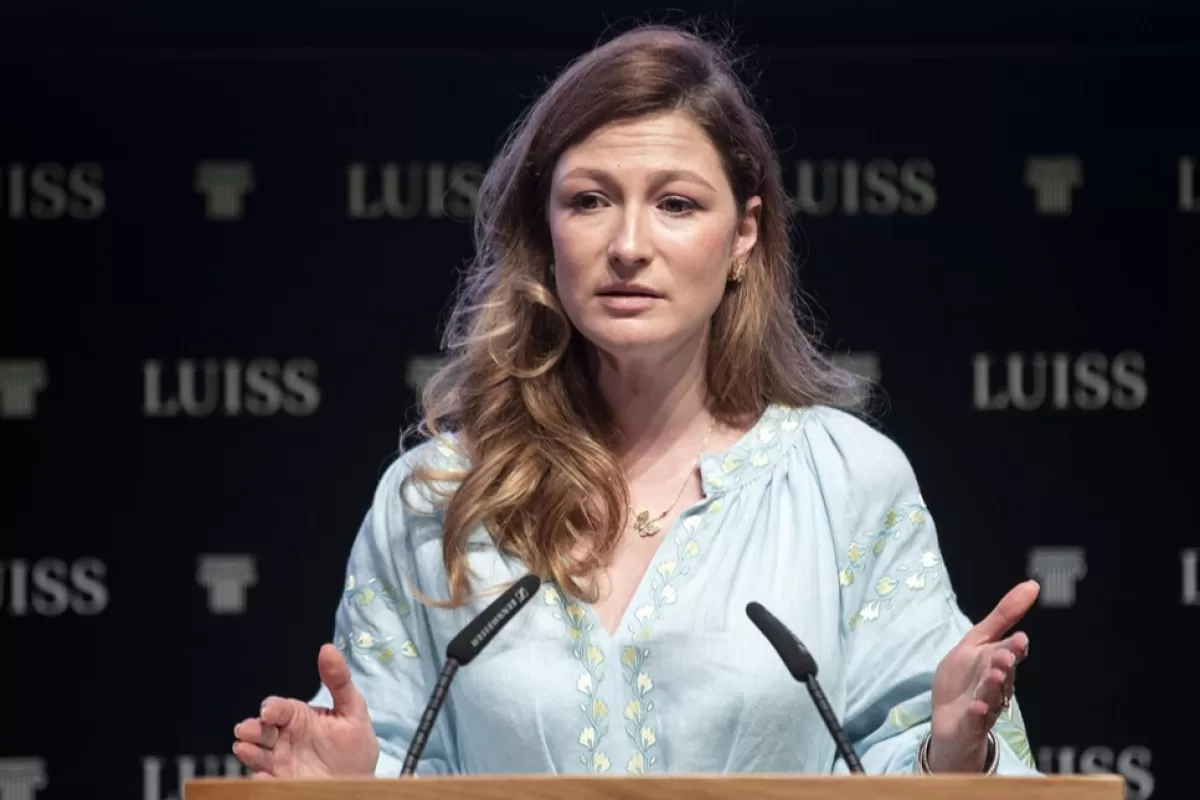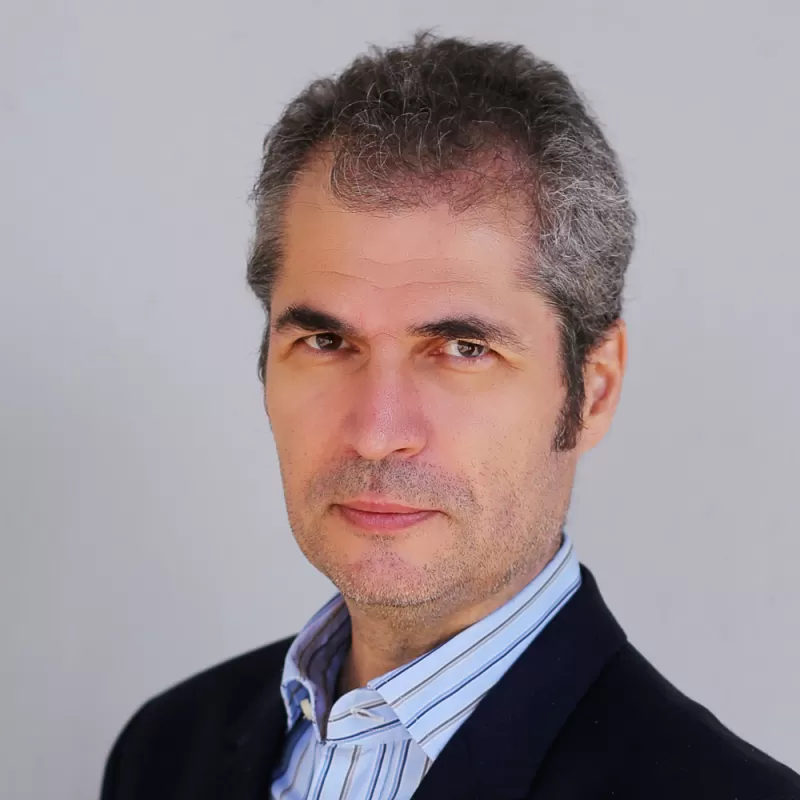
Crimean Tatars were the first victims of Russian aggression in Ukraine and continue to be persecuted by Moscow, according to Kiev's Deputy Foreign Minister Emine Japarova. In an interview with Veridica, Japarova, who coordinates the strategy of the Crimea Platform and is responsible, among other things, for public diplomacy and the relationship with international organizations, explained how Russia violates the Geneva Conventions and why its crimes in Ukraine can be considered a genocide.
The mobilization of Tatars is “another war crime committed by Russia in Crimea”
VERIDICA: After the 'partial mobilization' Putin called on September 21, Ukrainian and international media reported that Crimean Tatars received cca 80% of all Crimean mobilization notifications (60,000), even though they do not represent more than 15% of the population. Ukrainian authorities already said this is a deliberate policy to get rid of Tatars and a deliberate attempt to wipe out Tatars from Crimea. This is the definition of genocide. What are the arguments?
Emine Dzhaparova: Since the beginning of Russia’s full-scale invasion of Ukraine, territories temporary occupied by the Russian Federation have already faced several waves of mobilization, namely the so-called “hidden mobilization” conducted under the pretext of the terrorist threat.
After 21 September, the threat of mobilization hung over everyone in the temporarily occupied territories with even greater force. We have every reason to believe that the mobilization in the temporary occupied territories of Ukraine primarily affected those who are disloyal to the Putin’s regime and openly call for its overthrow and the de-occupation.
According to the information received from various sources the mobilization campaign in Crimea targeted specifically Crimean Tatars, indigenous people of Crimea who have proved to be non-loyal towards the occupation administration. The mobilization looked more like a special operation with raids early in the morning in the places of compact residence of Crimea Tatars with involvement of police and “Rosgvardia”. Some Crimean Tatars received notices right in the workplaces, some were delivered to the draft boards immediately. We also received information on mobilization of female doctors from Crimea.
The mobilization campaign organized by the Russian Federation in the temporary occupied Crimea is a clear violation of international humanitarian law and another war crime committed by Russia in Crimea.
According to the norms of international law, one of the forms of genocide is the deliberate creation of living conditions for a racial group or groups with a view to bringing about their complete or partial physical extermination. Genocide does not need to take the form of mass violence to be legally acknowledged. Article II of UN Genocide Convention outlaws the intended attempt to destroy national, racial, ethnical, or religious groups.
For genocide to be determined, the aggressor must commit an attempt to destroy one of the protected groups through the following main acts: 1. killing members of the group; 2. deliberately inflicting on the group conditions of life calculated to bring about its physical destruction in whole or in part.
And this is exactly what we witness in Crimea now!
I would like to underline, that the genocidal mission of Putin in Ukraine has been clear from his own statements, delivered to Russian and international audiences, before and during the war. Those messages explicitly outline the Russian state’s policy in its so called “special military operation” as non-existence of neither Ukraine, as an independent state, nor Ukrainians.
VERIDICA: The fourth Geneva Convention prohibits an occupying power from compelling occupied populations to serve in its armed forces. In September, according to the Ukrainian general staff, at least 139 Crimeans have been killed fighting for Russia in Ukraine since February, and 22 are currently prisoners of war. Is it an international war crime and can it be documented?
Emine Dzhaparova: Under the Fourth Geneva Convention relative to the Protection of Civilian Persons in Time of War, to which Russia continues to be a party, an occupying power may not compel residents of the occupied territory to serve in its armed or auxiliary forces. It also explicitly prohibits any “pressure or propaganda which aims at securing voluntary enlistment”. These norms are absolute, and their violation is a grave breach of the norms and principles of the international humanitarian law.
Ukraine is already doing its outmost to bring Russia to justice. The Ukrainian Initiative to establish a Special Tribunal for the Crime of Aggression against Ukraine is an extremely important step toward a broader, international effort to hold Russia accountable for its war crimes in Ukraine and aggression against our State.
Regarding documenting the facts of compelling Crimean Tatars to serve in Russian armed forces I would like to state that the Prosecutor’s Office of Crimea, based in Kyiv, regularly gathers data on forced enlistment in Crimea and includes this information in its reports to the International Criminal Court.
At the same time, I believe it is a very difficult mission, as it`s really hard to tell the exact number, but we are talking about thousands of conscripts. The practice of compelling Crimean Tatars to the Russian army was continued by the 16th waive of conscription started in Crimea on November 1, 2022.
“Russian aggression back in 2014 has turned Crimea into a place of unfreedom”
VERIDICA: Are human rights abuses documented in Crimea? After Russian annexation, how many Crimean Tatars have been imprisoned on politicized charges of 'extremism' or 'terrorism' and how many were prosecuted for ’discrediting the armed forces of the Russian Federation’?
Emine Dzhaparova: Russian aggression back in 2014 has turned Crimea into a place of unfreedom. Ukrainians, Crimean Tatars, and all those who oppose the occupation were deprived of their basic rights. The occupying authorities resorted to brutal repressions: enforced disappearances, torture, arbitrary detentions and judicial harassment.
Russia provides the systematic policy of oppression of all religious communities, not controlled by Moscow, specifically Muslim communities. Ban of the Mejlis and systematic oppressions of religious and cultural organizations have ruined the entire system of national institutions of the Crimean Tatars in the occupied Crimea.
The full-scale military invasion aggravated this situation and made it even more catastrophic. Currently more than 140 Ukrainian citizens remain detained by Russia under politically motivated charges in temporarily occupied Crimea and Russia. The total period of illegal detention of the Crimean Tatars is over 1300 years.
On September 21, 2022 the occupying administration issued shameful "sentence" to the First Deputy Head of the Mejlis of Crimean Tatar People Nariman Dzhelyal as well as brothers Asan and Aziz Akhtemov who were sentenced to 17, 15 and 13 years in prison.
It is yet another testimony of the politically motivated persecution by the Russian authorities of Crimean Tatars, who were held hostage by the criminal Putin regime due to their disagreement with the occupation of Crimea.
After the start of a full-scale aggression, Russia adopted new laws that have a repressive character. New legislation directed to chase, intimidate and persecute of all those who disagree with the actions of occupying country. This legislation has led to an increase of politically motivated cases in the temporary occupied Crimea.
According to certain data, the monitoring of the web sites of "courts" in Crimea for the period from March 4 to August 17 2022 made it possible to establish the understanding that the issues of alleged discretization of the armed forces of Russia were sent to "courts" 117 times. As a result of these 117 proceedings administrative penalty (fine) was issued in 96 cases. There is even a case when one person was brought to administrative responsibility twice.
VERIDICA: Joseph Stalin had the entire Tatar population deported to Central Asia during the second world war, wrongly smearing the group as Nazi collaborators. Many returned 40-50 years later. Was this one of the arguments why Crimea chose to be in Ukraine in the 1991 referendum?
Emine Dzhaparova: During the World War II from 1941 until 1945 Crimea was under German occupation. Having expelled the Nazi Army, Moscow baselessly accused the Crimean Tatar people of collaborating with the Nazis. Starting from May 18, 1944, the Kremlin deported more than 200,000 people, including newborn children, to Central Asia and other inland Soviet territories. This deportation turned into the Genocide, as during the first years of deportation 20-25% of Crimean Tatars perished.
On the 1991 Crimea sovereignty referendum 94% of voters supported the proposal to become a part of a newly independent Ukraine. And it is clear that Crimea remains an integral part of Ukraine and we will de-occupy it for certain.
VERIDICA: We met in 2016, when you were Deputy Minister of Information Policy. What are the theses of Russian propaganda regarding Crimea today? Do the Tatars and Ukrainians there still have access to information?
Emine Dzhaparova: Russian propaganda machine is the main tool to brainwash citizens and make them obedient. It spreads its cynical propaganda based on the principle “the worse the lies, the more people believe it”.
Media freedoms and access to information in Crimea are completely controlled by Russian security services and affected by Russian laws. Any journalist or blogger who provides the true information receives the status of “foreign agent” and is banned or persecuted.
Since the beginning of the occupation in 2014, Russia cut off Ukrainian TV and radio broadcasting in Crimea and closed independent media. For example, Russia forced ATR TV channel, where I used to work, to stop broadcasting in Crimea and relocate to Kyiv.
The next step in destroying access to independent information sources in Crimea was blocking Ukrainian Internet media resources. Such actions began in 2015 with selective blocking of Ukrainian and Crimean media for, as it was said, “extremist” content.
Many journalists who lived and worked in Crimea have left the peninsula and moved to Kyiv, and some have brought their families, afraid to leave them behind. Some have even left their profession to avoid risking their lives. Those who have decided to continue their independent journalism in the peninsula, despite their fears, have been subject to unprecedented levels of harassment from the security services, and they face continual searches of their homes, arrests, interrogations, “invitations” for chats with the police, the Prosecutor’s Office, the Investigative Committee and the FSB.
We at the Ministry regularly conduct information campaigns aimed at highlighting the situation in the temporarily occupied territories. Here are just a few examples of such activities:
- information campaign to the 8th anniversary of the beginning of Russia’s armed aggression against Ukraine;
- information campaign devoted to the Day of Remembrance of the Victims of the Genocide of the Crimean Tatar People (a campaign dedicated to honoring the memory of the victims of the forced deportation of the Crimean Tatar people by the Stalinist regime, the key element of which was the story of the illegally imprisoned Nariman Dzhelyal, the First Deputy Chairman of the Mejlis of the Crimean Tatar People);
- information campaign to the Day of the Crimean Tatar flag (the #FreePoliticalPrisonersOfCrimea campaign, the key signal of which was a call to the world to help free the Kremlin prisoners);
- to the Second Summit of the Crimean Platform (a series of thematic videos, in particular about the human rights situation in Crimea);
- to the International Day of Victims of Enforced Disappearance.
Despite all the attempts to block any alternative thought, I believe that anyone who wants to know the truth will always be able to find it, especially in our information age.


